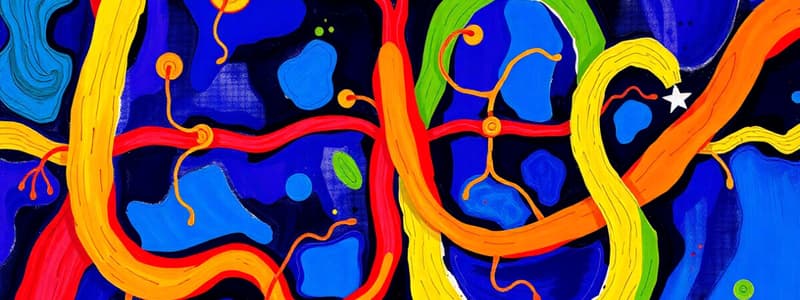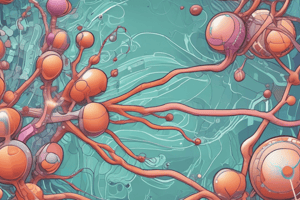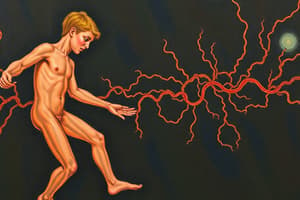Podcast
Questions and Answers
What enzyme deficiency is primarily responsible for lactose intolerance?
What enzyme deficiency is primarily responsible for lactose intolerance?
- Sucrase
- Galactose 1 phosphate uridylyl transferase
- Isomaltase
- Lactase (correct)
Which disorder is characterized by symptoms including watery diarrhea and abdominal discomfort due to enzyme deficiencies?
Which disorder is characterized by symptoms including watery diarrhea and abdominal discomfort due to enzyme deficiencies?
- Galactosemia
- Lactose Intolerance
- Glycogen Storage Disease
- Congenital sucrase-isomaltase deficiency (CSID) (correct)
In galactosemia, which enzyme's deficiency is responsible for the impaired conversion of galactose to glucose?
In galactosemia, which enzyme's deficiency is responsible for the impaired conversion of galactose to glucose?
- Hexokinase
- Lactase
- Galactose 1 phosphate uridylyl transferase (correct)
- Sucrase
What is a common symptom associated with glycogen storage diseases?
What is a common symptom associated with glycogen storage diseases?
What condition describes hereditary fructose intolerance?
What condition describes hereditary fructose intolerance?
The accumulation of what substance in lactose intolerance leads to diarrhea and abdominal pain?
The accumulation of what substance in lactose intolerance leads to diarrhea and abdominal pain?
What common symptom might suggest a glycogen storage disease?
What common symptom might suggest a glycogen storage disease?
Which of the following diseases is caused by the absence of sucrase and isomaltase enzymes?
Which of the following diseases is caused by the absence of sucrase and isomaltase enzymes?
What is the primary function of glycolysis in glucose metabolism?
What is the primary function of glycolysis in glucose metabolism?
Which characteristic is true regarding metabolic pathways?
Which characteristic is true regarding metabolic pathways?
Which of the following processes does NOT occur during glycolysis?
Which of the following processes does NOT occur during glycolysis?
What is the significance of the committed first step in a metabolic pathway?
What is the significance of the committed first step in a metabolic pathway?
In which part of the cell does glycolysis primarily occur?
In which part of the cell does glycolysis primarily occur?
What is the primary energy molecule generated during glycolysis?
What is the primary energy molecule generated during glycolysis?
Which of the following statements about glucogenesis is correct?
Which of the following statements about glucogenesis is correct?
Which of the following processes directly produces lactate from pyruvate?
Which of the following processes directly produces lactate from pyruvate?
What is the primary function of phosphoenolpyruvate carboxykinase in gluconeogenesis?
What is the primary function of phosphoenolpyruvate carboxykinase in gluconeogenesis?
Which enzyme is responsible for converting fructose 1,6-bisphosphate to fructose-6-phosphate?
Which enzyme is responsible for converting fructose 1,6-bisphosphate to fructose-6-phosphate?
What role does glucagon play in glucose metabolism?
What role does glucagon play in glucose metabolism?
How many ATP molecules are required to form one molecule of glucose from pyruvate in gluconeogenesis?
How many ATP molecules are required to form one molecule of glucose from pyruvate in gluconeogenesis?
What is the Cori cycle primarily responsible for?
What is the Cori cycle primarily responsible for?
Which of the following is NOT a disorder of carbohydrate metabolism?
Which of the following is NOT a disorder of carbohydrate metabolism?
Which substance is formed from the metabolism of glucose in skeletal muscle and RBCs and is transported to the liver for glucose formation?
Which substance is formed from the metabolism of glucose in skeletal muscle and RBCs and is transported to the liver for glucose formation?
What enzyme is present in the liver and kidneys but absent from muscle, affecting glucose export into the bloodstream?
What enzyme is present in the liver and kidneys but absent from muscle, affecting glucose export into the bloodstream?
Flashcards
Lactose Intolerance
Lactose Intolerance
Inability to digest lactose, a milk sugar, due to a lack of lactase enzyme.
Congenital Sucrase-Isomaltase Deficiency (CSID)
Congenital Sucrase-Isomaltase Deficiency (CSID)
Inherited disorder affecting sucrase and isomaltase enzymes, causing poor nutrient absorption and diarrhea.
Galactosemia
Galactosemia
Hereditary disorder affecting galactose conversion to glucose, causing build-up of toxic metabolites.
Glycogen Storage Diseases
Glycogen Storage Diseases
Signup and view all the flashcards
Hereditary Fructose Intolerance
Hereditary Fructose Intolerance
Signup and view all the flashcards
Lactase
Lactase
Signup and view all the flashcards
Enzyme Deficiency
Enzyme Deficiency
Signup and view all the flashcards
Nutrient Malabsorption
Nutrient Malabsorption
Signup and view all the flashcards
Metabolism
Metabolism
Signup and view all the flashcards
Metabolic Pathway
Metabolic Pathway
Signup and view all the flashcards
Glycolysis
Glycolysis
Signup and view all the flashcards
What are the products of Glycolysis?
What are the products of Glycolysis?
Signup and view all the flashcards
Anabolic Pathway
Anabolic Pathway
Signup and view all the flashcards
Catabolic Pathway
Catabolic Pathway
Signup and view all the flashcards
Where does glycolysis occur?
Where does glycolysis occur?
Signup and view all the flashcards
Does glycolysis require oxygen?
Does glycolysis require oxygen?
Signup and view all the flashcards
Gluconeogenesis
Gluconeogenesis
Signup and view all the flashcards
Pyruvate Carboxylase
Pyruvate Carboxylase
Signup and view all the flashcards
PEP Carboxykinase
PEP Carboxykinase
Signup and view all the flashcards
Fructose 1,6-bisphosphatase
Fructose 1,6-bisphosphatase
Signup and view all the flashcards
Glucose 6-phosphatase
Glucose 6-phosphatase
Signup and view all the flashcards
Cori Cycle
Cori Cycle
Signup and view all the flashcards
Glucose-alanine Cycle
Glucose-alanine Cycle
Signup and view all the flashcards
Study Notes
Carbohydrate Metabolism - Glycolysis and Gluconeogenesis
- Metabolism is a series of interconnected chemical reactions occurring within a cell.
- Metabolites are the chemical compounds involved in metabolism.
- Enzymatic reactions are organized into discrete pathways, transforming substrates into end products through many specific chemical intermediates.
- Metabolic pathways can be linear (e.g., glycolysis), cyclic (e.g., citric acid cycle), or spiral (e.g., synthesis of fatty acids).
- Metabolic pathways serve two functions: generating energy to drive vital functions and synthesizing biological molecules.
- Catabolic pathways are involved in the oxidative breakdown of larger complexes.
- Anabolic pathways are involved in the synthesis of compounds
- These types of pathways are usually exergonic (catabolic) or endergonic (anabolic) in nature.
- Metabolic pathways are irreversible.
- Each metabolic pathway has a committed first step.
- All metabolic pathways are regulated.
- Metabolic pathways in eukaryotic cells occur in specific cellular locations.
- Carbohydrates are broken down into three types of sugars before entering metabolism: monosaccharides, disaccharides, and polysaccharides.
- These are digested into simpler forms (Sugar).
Glycolysis
- Glycolysis is the process of breaking down glucose into two molecules of pyruvate.
- It takes place in the cytosol.
- Glucose proceeds to two pyruvates + 2ATPs + 2NADPH + H+
- Glycolysis is the conversion of Glucose to Glycogen in liver
- N Glucose to →(Glucose) or Glycogen
- The conversion of Glycogen to Glucose
- Glycogen or (Glucose) → n Glucose
- Gluconeogenesis - The synthesis of glucose from materials other than carbohydrates
- Aminoacid, lactate, Glycerol, Propionate takes place in liver and kidney.
- Glycolysis comes from two Greek words: Glykys (sweet) and Lysis (breakdown/splitting)
- Glycolysis is also known as the Embden-Meyerhof-Parnas (EMP) pathway.
- Glycolysis is a sequence of 10 enzyme-catalyzed reactions.
- In this oxidative process, 1 mole of glucose is partially oxidized to 2 moles of pyruvate.
- Glycolysis occurs in the cytosol of all cells, both aerobically and anaerobically, without molecular oxygen.
- Glycolysis includes the formation of lactate from pyruvate.
- The glycolytic sequence of reactions differs between species only in the mechanism of its regulation and the subsequent metabolic fate of the formed pyruvate.
- In aerobic organisms, glycolysis is the prelude to the citric acid cycle and electron transport chain (ETC).
- Glycolysis is the central pathway for glucose catabolism.
Glycolysis: Two Phases
-
Glycolysis has two phases:
- Preparatory phase (requires ATP)
- Payoff phase (produces ATP)
-
The preparatory phase involves the first five steps of glycolysis
- Phosporylating glucose by ATP to form Fructose-1,6-bisphosphate.
- Cleaving Fructose-1,6-bisphosphate into Glyceraldehyde-3-phosphate (GAP) and dihydroxyacetone phosphate (DHAP)
- Isomerizing DHAP into GAP
-
The payoff phase involves the last five steps of glycolysis, resulting in the release of ATP and the production of pyruvate.
Steps of Glycolysis
- Step 1: Phosphorylation
- Step 2: Isomerization
- Step 3: Phosphorylation
- Step 4: Breakdown
- Step 5: Isomerization
- Step 6: Oxidation
- Step 7: Phosphorylation
- Step 8: Isomerization
- Step 9: Dehydration
- Step 10: Transfer of phosphate from PEP to ADP
Fates of Pyruvate
- Entry into the citric acid cycle
- Conversion to fatty acid or ketone bodies
- Conversion to lactate
- Conversion to ethanol.
Overall Balance Sheet of Glycolysis
- Each glucose molecule yields 2 molecules of Glyceraldehyde-3-phosphate.
- The net equation for glycolysis is: Glucose + 2Pi + 2ADP + 2NAD+ → 2Pyruvate + 2NADH + 2ATP + 2H+ + 2H2O
Regulation of Glycolysis
- Three allosteric enzymes regulate glycolysis:
- Hexokinase/glucokinase
- Phosphofructokinase (PFK)
- Pyruvate kinase
Gluconeogenesis
- Gluconeogenesis is the formation of glucose from non-carbohydrate precursors.
- It is important for maintaining blood glucose levels during fasting, starvation, and limited carbohydrate intake, especially for the nervous system and erythrocytes.
- Gluconeogenesis is the opposite of glycolysis and uses different enzymes.
Importance of Gluconeogenesis
- Maintains blood glucose concentration during fasting, starvation, and limited carbohydrate intake.
- Essential for the nervous system and erythrocytes.
Salient Features of Gluconeogenesis
- Substrate: Glucogenic amino acid, lactate, glycerol, fatty acid, pyruvate, intermediates of TCA cycle, propionates
- Product: Glucose
- Site: Liver(90%), kidney(10-40%), intestine
- Compartment: Cytoplasm and mitochondria.
- Nature: Anabolic.
Glucogenic Amino Acids
- Certain amino acids can be converted into glucose.
- Intermediates of the citric acid cycle can also undergo oxidation to oxaloacetate.
Steps of Gluconeogenesis
- Reversal of pyruvate kinase
- Pyruvate carboxylase reaction, converting pyruvate into oxaloacetate
- Oxaloacetate to malate to exit the mitochondria
- Phosphoenolpyruvate carboxykinase, producing phosphoenolpyruvate
- Reversal of phosphofructokinase
- Fructose 1,6 bisphosphatase reaction, converting fructose 1,6 bisphosphate to fructose 6-phosphate
- Reversal of hexokinase
- Glucose 6-phosphatase reaction, converting glucose 6-phosphate to glucose
Disorders of Carbohydrate Metabolism
- Lactose intolerance
- Congenital sucrase-isomaltase deficiency (CSID)
- Galactosemia
- Glycogen storage diseases
- Hereditary fructose intolerance
- Diabetes mellitus
Detailed Description of Disorders of Carbohydrate Metabolism
- Lactose intolerance
- Symptoms: accumulation of lactose in the intestines causing osmotic diarrhea and flatulence, abdominal pain
- Cause: Deficiency of the enzyme lactase which is needed to break down lactose into simpler sugars
- Congenital sucrase-isomaltase deficiency (CSID)
- Symptoms: watery diarrhea and abnormally low body fluids
- Cause: Deficiency of sucrase-isomaltase enzyme needed to break down sucrose and isomaltose
- Galactosemia
- Symptoms: buildup of galactose as a metabolite becomes toxic to the liver and kidneys, cataracts
- Cause: Deficiency of the galactose 1 phosphate uridylyl transferase, an enzyme needed to convert galactose
- Glycogen storage diseases
- Symptoms: growth abnormalities, weakness, enlargement of the liver, low blood sugar, confusion
- Cause: Defects in the enzymes needed for the metabolism of glycogen
- Hereditary fructose intolerance
- Symptoms: low blood sugar, vomiting, sweating, confusion, kidney damage
- Cause: Lack of the enzyme needed to metabolize fructose
- Diabetes mellitus
- Symptoms: high blood sugar levels
- Cause: Inability of the body to produce or respond to insulin properly
Studying That Suits You
Use AI to generate personalized quizzes and flashcards to suit your learning preferences.




